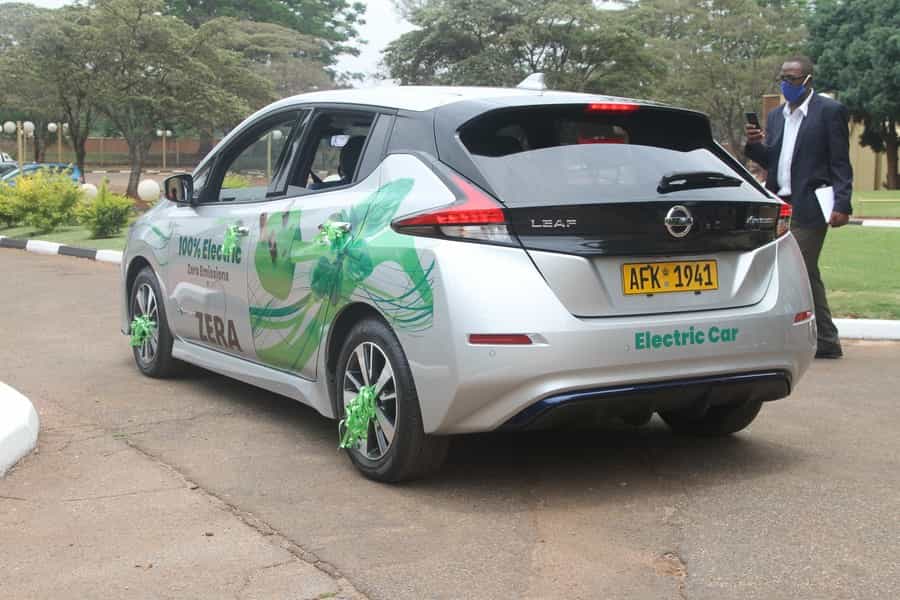
🚙 Electric vehicles gain traction in Southern Africa
Governments across the globe are making efforts to reduce carbon emissions and Zimbabwe is no exception. The Southern African country is now putting policies in place to promote electric vehicles together with renewable energy.
Share this story!
Around the world, governments are making frantic efforts to reduce carbon emissions through various interventions. Southern Africa is no exception; various policies have been put in place in the same vein. These include renewable energy policies and frameworks to promote the adoption of electric vehicles (EVs) or e-mobility.
According to The South African Institute of International Affairs (SAIIA) the demand for EV during the post COVID-19 green economic recovery is forecasted to grow and capture at least half the market share from internal combustion engines (ICE) vehicles by 2040.
The underlying reason is the adoption and ratification of the Paris Agreement by 197 countries. This agreement forms part of the United Nations Framework Convention on Climate Change. The countries that have adopted and ratified the Paris Agreement have submitted Nationally Determined Contributions (NDCs) which communicate the actions that they will take to reduce greenhouse gas (GHG) emissions in their respective countries.
“Electric vehicles are vital for reducing GHG emissions as they eliminate the need for fossil fuels such as petrol or diesel in the transport sector, which contributes 16.2% of global GHG emissions,” SAIIA said.
To grab its share of the EVs, Zimbabwe is currently developing an electric mobility framework (EMF) to open space for increased adoption and uptake of electric vehicles, a move that will also considerably reduce the country’s fuel import bill.
Zimbabwe Energy Regulatory Authority of Zimbabwe (ZERA) Chief Executive Officer, Eddington Mazambani opined that the framework will create a favorable environment for increased use of electric powered vehicles in the Southern African country.
ZERA has already procured the demo electric vehicle and supporting infrastructure, standards, and regulations are being developed.
“Going forward, we are planning to coordinate how renewable energy technologies such as solar PV can be deployed to cater for the charging of EVs. We also intend to engage industry players on the installation of pilot charging infrastructure at strategic locations to stimulate uptake of the EVs,” said Mazambani.
The EMF has national targets and proposals which include duty and VAT free imports to stimulate growth of the sector and facilitation of investment in at least two EV assembly plants.
Public transport companies are expected to participate in the growth of the sector through procurement of electric buses, initially for demonstration purposes.
Zimbabwe broke new ground in May 2020 after VAYA Africa, a Mauritius-registered transportation service company launched an electric vehicle service in the country as part of the company’s rollout strategy across Africa.
“We are excited to launch the ‘VAYA Electric’ vehicle as we start our journey of deploying innovative ways of harnessing clean, renewable energy to provide safe and convenient transportation services to the public on the African continent,”Dorothy Zimuto, the Chief Executive Officer of Vaya Mobility, said then during the launch in Harare.
EVs save up to 40% on the major running costs of fuel and regular maintenance, in comparison to vehicles that run on fossil fuels.
Other benefits of the use of EVs include less frequent services and fewer scheduled vehicle maintenance check-ins than ordinary combustion engines. They will require minimal scheduled maintenance for their electrical systems, such as the battery and electric motors. Other parts such as brakes also last longer because of their regenerative braking systems, where the battery is charged when braking.
Government will also promote the charging of EVs from renewable energy such as solar to ensure further reduction of greenhouse gas emissions.
In 30 years’ time, there is predicted to be 3.5 million vehicles on Zimbabwe’s roads, more than double the 1.5 million cars that puffed and smoked in 2016, according to official Zimbabwe National Road Authority data. In 1994, the number of cars in Zimbabwe averaged under 400 000.
The surge in vehicle numbers is expected to lead to a 130 percent spike in greenhouse gas emissions from this sub-sector only with emissions reaching the equivalent of 5.3 million tonnes of carbon dioxide (tCO2e) by 2050, up from 2.3 million tCO2e in 2015. In light of this, EVs are the game changer.
Zimbabwe imports all of its petrol and diesel spending about $1.2 billion annually on fossil fuel imports. These imports are almost a third of its annual import bill. This puts immense pressure on its current account position. EVs will go a long way in reducing this bill.
In terms of electric cars adoption, the country might have a head start compared to other nations in Africa and elsewhere around the world because Zimbabwe recently discovered large deposits of lithium (key component in the manufacturing of batteries) which could be useful in e-mobility thus reducing emissions and also increasing adaptation through increased incomes from the proceeds of the mining.
🗳 Since democracy is crucial in a fact-based optimistic world... we remind our readers of the democratic status of the countries we write about:
Zimbabwe has a Global Freedom Score of 29 and has the status Partly Free.
By becoming a premium supporter, you help in the creation and sharing of fact-based optimistic news all over the world.


